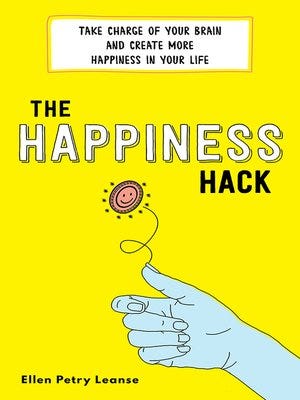AN011: Hacking Your Financial Happiness
Our brains are constantly wiring our responses to money.
This week I’m delighted to share with Athena Notes readers a conversation with Ellen Petry Leanse, the author of “The Happiness Hack.” In her book (which has also recently been released on Audible) Ellen explores the workings of the brain and its impact on happiness. In anyone else’s hands, that would likely end up being dense and boring, but Ellen brings the subject to life with her lively writing and great stories. The book is based on her long career in technology (including the early years of Apple and Google), and her work as an innovator, executive advisor, and coach.
Terri Lonier: Ellen, the brain is an amazing three-pound marvel in each of us. How does it tie in to mindset, and how does it influence our actions?
Ellen Petry Leanse: The brain wires, literally, what it fires. We all have long-held beliefs, about money or other things, that have shaped our actions and our life. They’ve also shaped our brain, wiring it to do more of all it’s done in the past — even when something inside us no longer wants to react that way.
Conscious changes, reframes, and intentions take effort because they have to overcome the pull of those well-worn grooves. That’s biological. New information — like a chosen mindset — tends to get processed in the prefrontal cortex, or PFC, the base of thought and intentional perception located right behind our forehead. When we choose a new mindset — a novel way of seeing and responding to our circumstances — we often experience resistance, or find ourselves reacting like we’ve always done before.
TL: So that’s why it can be so frustrating to try to change a habit or see things through a new mindset?
EPL: Yes. A simple, yet scientifically sound, way to understand why this happens is that processing in the PFC is slower and less efficient than processing in the “hardwired” areas that direct most of our thought. The brain takes the easy, well-worn option whenever it can.
This maybe gives a hint on why it can be hard to update our thinking about money. Yet, good news: We can indeed change our brain. If we choose an intentional mindset focused on new feelings, behaviors, and outcomes related to money, and if we practice actions that reinforce those mindsets, we can update that hardwiring and make that new thinking the go-to the brain chooses. It takes time, persistence, and continuity — yet changes happen.
I call this framework “mindset, skillset, brainset” — a way for intention and practice to fire in ways that the brain will wire.
TL: In your book, you talk about the 100+ chemicals that regularly flow through our brains, including happiness modulators such as dopamine and serotonin, and stress modulators such as endorphins, cortisol, and adrenaline. How might these influence our financial decisions and other areas of our life?
EPL: Brain patterns and chemistry influence all decisions, and even perceptions — including anything financial, since money carries an emotional charge for most people. You’ve probably heard enough about dopamine or serotonin to know the role they play in driving us to take action or seek rewards. It’s important to remember that neurochemistry drives biological functions that direct and reward behavior, and even perception. The good news is that we can use mindsets and skillsets to practice positive associations with money, even when we’ve had a prickly or stressful relationship in the past.
TL: Money can be incredibly stressful for women. What should we know about stress and the brain?
EPL: Stress changes our thinking. When we feel stressed, we are much more likely to “re-act” based on past patterns, even when we wish to change them. If we have patterns of anxiety or fear around money, there are likely emotions associated with scarcity, vulnerability, unfairness, worthiness, or some other experience that left us feeling fearful or at risk. When the brain “re-acts,” we can help it respond, intentionally, changing our thoughts and even actions.
One of the best ways to do that is to breathe, deeply, the moment that the fear response arises. Become aware of the rising reaction, and respond instead. This, by the way, is mindfulness in action: doing what our mind wants, not simply what our brain chooses to do.
Remember:
Change takes effort because our brains have well-worn paths
We can use mindsets and skillsets to create positive associations with money
We can offset fear caused by stress by breathing deeply the moment fear arises
My challenge to you this week:
When it’s time to make a money decision, slow down and sense your emotional response. Decide if it’s one you want to keep “firing” and “wiring.”
PS: Join me for a lively discussion with Ellen Petry Leanse on Clubhouse on Tuesday, May 18th at 8pmET/5pmPT. Join our chat on money, the brain, and how technology influences our time, our spending, and our relationships.




